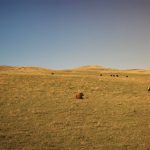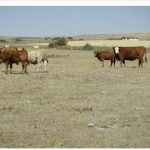MOOSE JAW, Sask. – They stretch across the front of the Elks Hall, with just enough room for a large screen and the coffee pot.
Eleven candidates in suits, jeans and in one case a skirt. Some favor a single-desk seller, others a dual market. Two are non-committal.
All hope to be the first elected Canadian Wheat Board director from district eight.
But first the voters have to mark their ballots. That, said candidate Terry Hanson of Fillmore, will be difficult.
Issues aside, the number of candidates alone makes it a tough choice, he said.
Read Also

Land crash warning rejected
A technical analyst believes that Saskatchewan land values could be due for a correction, but land owners and FCC say supply/demand fundamentals drive land prices – not mathematical models
“With me there is no fuzziness,” the single-desk supporter said. “You all know where I stand.”
At the second of only two candidates’ forums in the district, it is hard to tell what the voters are thinking. Each candidate is given three minutes to make an opening statement. Written questions from the audience are randomly drawn from a box and each is given a minute to answer. They make it through seven questions in two hours.
“You would get a little better feeling of how it’s going,” if there was interaction with the audience, said Moose Jaw candidate Wally Meili.
But the first candidates meeting in Weyburn was a little “vocal,” he said. In Moose Jaw, the questions are read by the meeting chair.
One voter asked how much each candidate, if elected, would expect to be paid. The new board of directors will determine their own salaries.
Most agreed a per diem, expenses and the cost of hiring someone to run their farm in their absence would be fair.
“Salaries shouldn’t be a consideration,” said Jerry Gustafson of Macoun.
Added David Helstrom of Gray: “I don’t think anyone here is going to go into this for the money.”
Tim Gerein of Montmartre said candidates received information suggesting the private corporation rate of $25,000 per year as a guideline.
“You people tell us,” he said.
Rod Flaman of Edenwold didn’t offer an amount. But he said $25,000 is less than the salary of CWB chief commissioner Lorne Hehn’s fitness trainer.
“Look out, it might get expensive,” said Weyburn-area farmer Art Mainil, who noted members of Parliament and senators also get to set their own salaries.
Riceton farmer Don Schmeling drew laughter for his thoughts: “I’m not going to work for nothing. If I want to do that I can just keep on farming.”
Another voter asked about the use of permit books to determine who can vote.
“We will have books electing a director,” the questioner wrote. “This vote should have been weighted.”
Tim Coulter of Briercrest said he didn’t believe in a weighted vote: “The process has been right.”
But Margaret Ellard of Moose Jaw said a better system could have been used.
“There are some farmers who feel their vote isn’t getting the weighting it should,” she said.
Brian Olver of Windthorst said he worried about the mail-in ballot because “anybody can get hold of them and mail them back.”

















